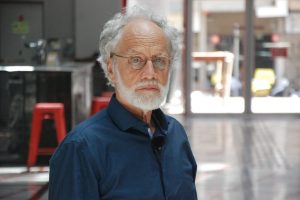Markus Imhoof’s film draws parallels between today’s situation and WWII
With a humanitarian emergency as ubiquitous and contentious as the global refugee crisis, it can be difficult to offer a fresh perspective. Yet Markus Imhoof manages to do just that in his new documentary film Eldorado, which juxtaposes the current situation with the award-winning Swiss director’s own personal tale.
Imhoof achieved fame with a previous movie, The Boat Is Full, which examines Switzerland’s neutrality during the Second World War. This was followed by a more recent documentary on declining honeybee populations, More Than Honey. His latest offering dives headfirst into the thorny issue of the massive influx of asylum seekers into Europe.

‘Eldorado’ director Markus Imhoof.
The film follows the migrants’ desperate journey from the shores of Africa and the Middle East to the beaches of Italy from the perspective of Operation Mare Nostrum, a now-defunct naval and air operation initiated by the Italian government that aimed to counteract the massive spike in migrant ship wreckages in the Mediterranean Sea.
“It’s shocking to see people dying,” Imhoof related in an interview with The Media Line. “We couldn’t show dead bodies because I [couldn’t] ask them whether they wanted to be filmed.”
Eldorado—which premieres in the United States this fall—is being screened in Israel at Docaviv, the country’s only festival dedicated uniquely to promoting documentary films. Now in its twentieth year, the prestigious event features more than 120 films examining a wide range of issues, from the refugee crisis to women’s rights to conflict and war.
Eldorado does not simply end on the shores of Italy, however, but rather continues to document attempts by surviving asylum seekers to navigate the perils of building new lives in Europe. Many of the migrants in the film find themselves stuck in bureaucratic limbo: that is, unable to leave makeshift camps until they receive legal status. Moreover, none end up making it to the “Promised Land” of northern Europe due to the so-called Dublin Regulation, a European Union Law stipulating that asylum seekers must remain in the first EU country they enter. Many migrants therefore arrive at a dead-end, forcing them into the dark underworld of organized crime and slave labor. The movie also includes rare footage of the inside of a refugee camp, where cameras are seldom permitted.
“I was in the camp of the mafia in Italy—it’s called “Ghetto”—and the people who didn’t receive asylum worked there as slaves,” Imhoof conveyed to The Media Line. “They earn 15 euros per day working in 40 degree [Celsius heat]. They even try to send money back home.”
Whereas Eldorado aims to uncover the criminal elements exploiting the refugee crisis for their own financial gain, there is also a deeply personal component to the overall story. Interwoven into the film’s narrative is Imhoof’s account of his family’s decision to house an Italian child refugee named Giovanna in the aftermath of World War Two.
“[Taking in Giovanna] was a shock,” he exclaimed. “I had to live with her and [share my food and toys with her]. It was like the war had entered my home.
“[But it] ended up being the first love story of my life,” Imhoof continued. “She had to go back [to Italy] and she died. So when you have this kind of scar on your soul, you never forget that it is possible to love a stranger.”
It is a message of tolerance and compassion the director hopes viewers will retain—and propagate—long after they finish watching his film.